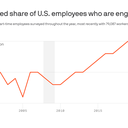DE&I recalibration from the likes of Amazon, Meta, Publicis sparks questions around faltering commitments
Any flicker of hope that the ad industry would renew its commitment to diversity, equity and inclusion in 2025 may be getting dimmer just days into the New Year. Recently, Amazon, Meta, Publicis Groupe and McDonald’s joined the growing list of companies to revamp (or roll back, depending on who you ask) their DE&I policies.
Last Friday, it was announced that Amazon was seemingly halting its diversity programs, “winding down outdated programs and materials” as part of its broader business initiatives review process last year, according to a internal memo from Candi Castleberry, Amazon’s vp of inclusive experiences and technology, which Amazon provided to Digiday. Similarly, Meta was said to be terminating its major DE&I programs, including those geared toward hiring, training and picking suppliers, according to Axios.
Earlier in the week, Publicis Groupe reportedly cut its DE&I teams, including removing its chief diversity officer Geraldine White from her post of the past four years. Per AdAge’s reporting, White will continue to work with the holding company on a consultant basis as the company is in the process of hiring White’s successor. Meanwhile, McDonald’s is restructuring its approach to diversity by retiring its supplier diversity efforts, rebranding its diversity team as the “Global Inclusion Team” and sunsetting the concept of setting “aspirational representation goals” to instead focus on embedding inclusion practices into everyday operations. (Meta, McDonald’s and Publicis didn’t respond to Digiday’s requests for comment. When asked for comment, a spokesperson for Amazon provided Castleberry’s memo to Digiday.)
Continue reading this article on digiday.com. Sign up for Digiday newsletters to get the latest on media, marketing and the future of TV.




:max_bytes(150000):strip_icc():format(jpeg)/Patrick-Randi-Mahomes-070424-04-90d3fdef83a44540b1859844e04f7823.jpg)

